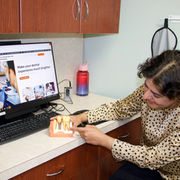What are the most common upper denture problems?
- May 23, 2023
- 3 min read
Upper dentures are removable appliances that can replace missing teeth in the upper jaw. They are made up of a pink, gum-colored base that fits over the gums and a set of custom-made artificial teeth to fit the shape and size of your mouth.
Upper dentures can be a good option for people who have lost some or all their upper teeth due to injury, decay, or other dental issues. They can help restore function to the mouth, allowing you to eat and speak more efficiently, improve your appearance, and boost your self-confidence. Getting upper dentures may require multiple visits to your dentist, as the process involves taking impressions of your mouth, fitting the dentures, and adjusting as needed. Your dentist can help you determine if upper dentures are the right option for your dental needs and can provide guidance on caring for your dentures to ensure they will last for a long time.

Upper dentures are typically made from materials such as acrylic resin or porcelain and can be customized to match the shape, size, and color of your existing teeth. They are designed to be comfortable and easy to wear and can be easily removed for cleaning or sleeping. It may take some time to adjust to speaking with an upper denture, and you may experience some difficulty pronouncing certain words at first. However, most people can talk comfortably with their dentures with practice and patience. Proper care of your upper denture is essential for maintaining fit, function, and appearance. Your dentist will provide detailed instructions on how to care for your denture. Generally, you should clean it daily with a denture brush and mild soap or denture cleaner, rinse it thoroughly, and store it in a container with water or denture solution when not in use. The lifespan of your upper denture will depend on various factors, including the quality of the materials, the fit of the denture, and how well you care for it. In general, upper dentures can last several years before needing to be replaced.
While dentures can restore function and appearance to your smile, they can also come with specific problems. Here are some of the most common upper denture problems:
Difficulty Eating: Upper dentures can affect your ability to chew and eat certain sticky or hard foods. This is because they can slip or move around in the mouth, making it harder to chew properly.
Soreness and Irritation: If the upper denture is not fitted properly or adjusted correctly, it may cause soreness, irritation, or even ulcers on the gums, palate, or tongue.
Slipping or Loose Fit: Upper dentures can sometimes slip or move around in the mouth, which can be uncomfortable and embarrassing. This is often due to a poor fit or lack of suction.
Speech Impediments: It may take some time to adjust to speaking with upper dentures, and you may experience some difficulty pronouncing certain words.
Changes in Taste: Some people may experience changes in their sense of taste due to the presence of the upper denture.
Bone Resorption: When teeth are missing, the jawbone may shrink over time. This can affect the fit of the upper denture and may require adjustment or replacement.
Oral Health Issues: If the upper denture is not cleaned properly or does not fit correctly, it can lead to oral health issues such as gum disease or tooth decay.
If you are experiencing any of these problems with your upper dentures, it is crucial to speak with your dentist. Only dental professionals can evaluate the fit and function of your upper denture and recommend solutions to improve your oral health and overall comfort. With proper care and maintenance, upper dentures can be a comfortable and effective solution for replacing missing teeth in the upper jaw.
For more information about dental health, please call one of our offices or contact us online.














My upper plate is causing pain on the left side of my mouth. It also slips and slides around constantly....very painful and uncomfortable . I've had them only 6 days, but I'm going nuts already. How long does it take to feel comfortable? And forget about eating.....impossible! I've already lost 5 pounds......this is awful!